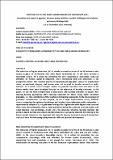Por favor, use este identificador para citar o enlazar a este item:
http://hdl.handle.net/10261/235344COMPARTIR / EXPORTAR:
 SHARE
BASE SHARE
BASE
|
|
| Visualizar otros formatos: MARC | Dublin Core | RDF | ORE | MODS | METS | DIDL | DATACITE | |

| Título: | Graduates´ performance according to teaching and learning approaches |
Autor: | Navarro Milla, Isidora; García Aracil, Adela CSIC ORCID; Isusi, Rosa | Fecha de publicación: | 14-dic-2020 | Citación: | Eu-SPRI ECC: ¿Innovation and research agendas: between policy priorities, societal challenges and academic autonomy? (2020) | Resumen: | The relevance of higher education (HE) is usually assessed in terms of the fit between what society expects of institutions and what these institutions do. In the move towards a knowledge society, HE is critical for promoting the core competencies (knowledge, skills and attitudes) for human capital development, where memorizing facts and procedures is not enough for success. The common practice of measuring HE graduates¿ success by employment status, occupational category, and income does not respond to broader research or policy interests. As a result, several complex models of graduate transition from education to the labour market have been developed focused on the relevance of learning outcomes. In this paper, we use the term competencies in association with learning outcomes to analyse how teaching-learning approaches affect learning outcomes for those young higher education graduates, i.e., the contribution of the teaching and learning approaches to the development of graduates¿ competencies. For that purpose, we use a major representative survey, FOSTERC survey, comparing the opinion of graduates and teachers from Belarusian public universities. A representative sample of 5,443 graduates holding a first higher education degree were surveyed three years after graduation, that is, those graduated during the academic year 2014/2015, and 3,140 teachers. Our preliminary results show the relevance of active learning methods like problem-based learning and project-oriented education in preparing students for entering to the labour market. Moreover, it is important that students become involved in research during their study as a basis for developing entrepreneurial skills and personal development. | Descripción: | Trabajo presentado en 2020 Eu-SPRI ECC: ¿Innovation and research agendas: between policy priorities, societal challenges and academic autonomy?, celebrado en modalidad virtual del 14 al 16 de diciembre de 2020. | URI: | http://hdl.handle.net/10261/235344 |
| Aparece en las colecciones: | (INGENIO) Comunicaciones congresos |
Ficheros en este ítem:
| Fichero | Descripción | Tamaño | Formato | |
|---|---|---|---|---|
| Graduates_Navarro_ComCong2020.pdf | 192,38 kB | Adobe PDF |  Visualizar/Abrir |
CORE Recommender
NOTA: Los ítems de Digital.CSIC están protegidos por copyright, con todos los derechos reservados, a menos que se indique lo contrario.
